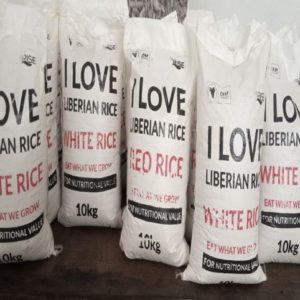PHOTO: Sen. Saah Joseph (far right in white) making the disclosure in the company of Robert Bimba, Chris Thomas, Former Lutheran Bishop, UNDP Dep. Rep. Louis Kuupen
By Augustine Octavius, augustineoctavius@gmail.com
The Liberian government is said to be considering increasing the subsidy for rice importers from 11 million United States dollars to 20 million United States Dollars in the next fiscal year.
President George Weah CDC government’s heavy subsidies to foreign businesses which import over US$200 million rice into Liberia annually has come under serious criticisms from various quarters in the country. The criticisms have grown more intense recently, in the wake of the major rice shortage couple with hoarding and increase of the country’s staple food on the local market.
Critics have said instead of the government pumping in millions to rice importers, such huge amounts should be invested in local agriculture to boost local rice production in this West African country that has rich and fertile soil year-round.
But the Chairman of the Senate ‘s Committee on Executive, Montserrado County Senator (CDC), Saah Joseph said recently that the Liberian Senate is taking that decision to increase subsides to rice importers, because the government has received information that there will high rate of food shortage globally next year.
Senator Joseph made the disclosure when he performed the dedication of the rice processing facility owned by the Community of Hope Agriculture Project in Zubah Town, Dupport Road Paynesville during the weekend.
At that program, the Deputy Resident Representative for Programme at UNDP called for a sustainable and viable seed production programme to increase agricultural productivity and improve the livelihoods of rural smallholder farmers.
Mr. Louis Kuukpen acknowledged the role of small holder farmers emphasizing that when local agriculture MSMEs and farmers are empowered, they can manage resources sustainably and contribute significantly to addressing rice supply in Liberia and the unique role of smallholders in addressing the Sustainable Development Goals (SDGs) by their contribution to inclusive growth and employment generation, a UNDP press release said at the weekend.
Sen. Joseph however, said importing rice from abroad is not a sustainable venture in proving the country’s stable and criticized former President Sirleaf’s former Unity Party government. Instead, he said the best way is to provide funding to farmers locally.
“Under the former government,” he went on, “500 million United States Dollars was donated towards agricultural sector in the country; regrettably, there is nothing to show for it.”


Seed Rice 10 Kg bag of rice
The Montserrado County Senator maintained that when this amount of money was really spent appropriately, there will more than 20 modern rice milling machines around because it is just two million United States Dollars for a brand new one including the dryer
Sen. Joseph claimed that no country in West Africa is doing what this CDC government is doing by subsidizing rice importation for its citizens.
Local farmers cry for assistance from Gov’t
remarks, the Executive Director of the Community of Hope Project, Reverend Robert Bimba appealed for support for the procurement of more machines, in order to produce more rice on the Liberian market.
According to him, the more that Liberia spends millions of United States Dollars for the importation of food is an invitation for poverty into the country and it constitutes exportation of labor to those countries the food is coming from.
He explained that the warehouse was constructed at the cost of 10,000 United States dollars through the contribution of Cultiv8 Nation based in the United States whose Executive Director, Chris Thomas, watch through the social media.
Rev. Bimba indicated that 80 percent of the rice harvest last year spoiled because of the absence of a dryer machine and there is need a for a pickup truck to transport the other farms to Monrovia form processing.
For his part, the Deputy Resident Representative for Program at the United Nations Development Program, Louis
He acknowledged the important role of small holder farmers emphasizing when local agricultural farmers are empowered, they can manage resources sustainably and contribute significantly in addressing rice supply in Liberia
The program, which ended with symbolic sale of few 10kg bags of rice, was graced by Reverend Sandee Stepter, Second Vice President of the Liberia Council of Churches; Ephrain Teage, Deputy Director of Protocol, Office of the Vice President, Wilmot Wesseh; the Resource Officer in the office of the Representative District Four, Montserrado County and the Ministry of Agriculture.

